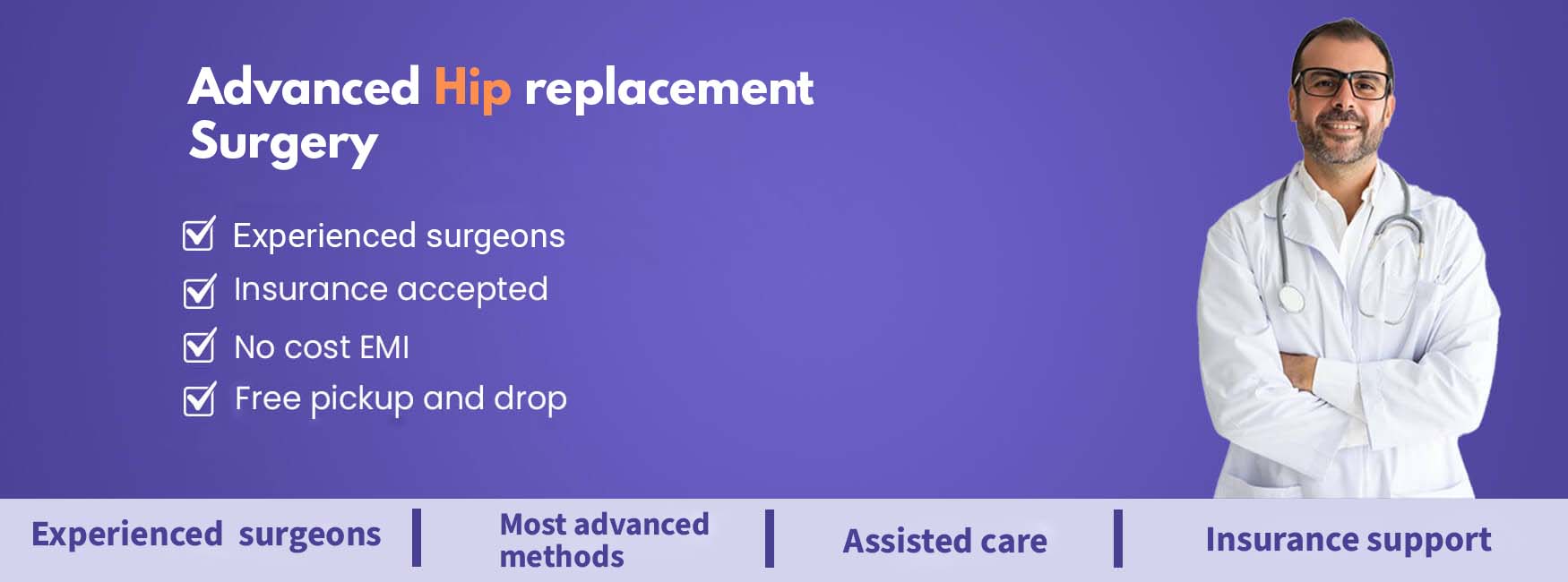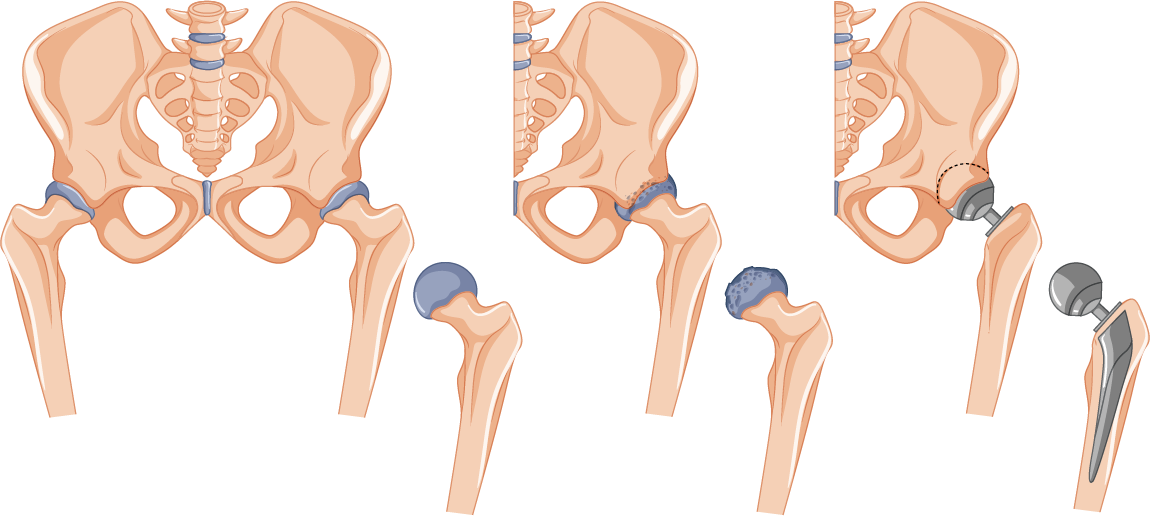
 1
1
 2
2
 4
4

Hip replacement, also called total hip arthroplasty, is a surgery that’s done to treat osteoarthritis (damaged bone and cartilage of hip joint) and replace with artificial implants prosthesis. Hip replacement is needed when people get older and the cartilage which cushions between the bones and the hip joint begins to degenerate and wear away.
Total hip replacement is needed when the patient has persistent hip pain, limiting their daily activities despite medication; worsening hip pain when walking or bending; stiff hip, inability to move or lift the leg; having trouble moving out of a seated posture.
This can be due to the following conditions:
Osteoarthritis damage to the cartilage or wear-and-tear arthritis
Osteonecrosis due to dislocation or fracture of the hip affecting the mobility.
Rheumatoid arthritis or an inflammatory disease which causes inflammation, deformed or damaged joints.
Tumor in the hip joint.
We at FirstCure Health will first recommend medicine for pain or inflammation, walking aids, joint injections and physical therapy and when these measures do not relieve pain and stiffness, hip replacement surgery is suggested to restore function and improve quality of life.
We offer three major types of hip replacement:
Total hip replacement also called total hip arthroplasty. This is the most common surgery to replace worn-out or damaged sections of hip with artificial implants. The socket is replaced with a durable polymer cup, which may or may not also include a titanium metal shell. The femoral head will be removed and replaced with a ball made from ceramic or a metal alloy. The new ball is attached to a metal stem that is inserted into the top of the femur.
Partial hip replacement also called hemiarthroplasty involves replacing only one side of the hip joint – the femoral head – instead of both sides as in total hip replacement. This procedure is most commonly done in older patients who have fractured their hip.
Hip resurfacing of the femoral head and socket is most commonly done in younger, active patients.
X-ray of a total hip replacement showing the ball, socket and stem implants.
To begin the operation the surgeon will make an incision:
At the back or called the posterior approach (most common)Both approaches offer pain relief and improvement in walking and movement within weeks of surgery.
A complete physical examination is conducted to assess if the patient is fit for the surgery.In addition, several tests such as blood and urine test, Electrocardiogram (ECG) and chest x-ray are taken to help the surgeon plan the surgery.
Ongoing consumption of medication must be discussed with the doctor before the surgery because some medications may cause problems with the surgery or during the recovery post-surgery. These medications must be avoided. Use of tobacco products must be stopped as it affects the recovery process.
Below the waist (epidural) or general anaesthesia (whole body) is given. The surgeon makes an incision on the back front or side of the hip to remove the damaged bone and cartilage.
Artificial hip joints have two components: the ball component and the socket component. The prosthetic components could either be press-fit or cemented depending on the patient's bone quality and strength. At times, a combination of non-cemented and cemented sockets may be used depending upon the orthopedic surgeon.
The prosthetic socket is implanted, after which the surgeon bends and moves the leg to ensure the proper function.
Layers of tissue are closed with stitches that dissolve and the outermost layer of skin is closed with sutures.
The procedure takes 1-2 hours, and post-surgery the patient is moved to the recovery room until the anaesthesia wears off.
The surgeon will inform you when it is safe to go home, depending on your condition.You may need an X-ray, immediately after the procedure and during recovery, to confirm that your surgery was successful and that the new hip is healing well.
When the surgery is minimally invasive, the surgeon accesses the hip joint though one or two small incisions by moving the muscles aside. The surgeon will take into consideration your age, weight, fitness level and other factors to decide if you are a good candidate. This approach is less painful, offers quicker recovery and shorter hospital stay.
Patients must prepare themselves with several modifications to their surroundings and lifestyle post-surgery. Some of it includes using handrails on the stairs and bathrooms for support, using cranes, crutches or a walker after surgery, and other tasks that may require assistance.
We have a team of Orthopedic specialists in joint replacement procedures. We also offer guidance through every step, from pre-surgical education to postsurgical care and physio therapy; as we work closely with anesthesiologists, rehabilitation specialists and nurses for patient’s safety and health.
We understand that a surgery need can be stressful that’s why we want you to focus only on getting better and leave everything else to us. We simplify your surgery experience by bringing together:
 1
1
We have some of the best surgeons who are highly reputed, skilled with most modern procedures and have atleast 10 years of experience. You can be rest assured of being in safe hands at all times.
 2
2
We use the most advanced surgical procedures like laser, laparascopic and other minimal invasive procedures to ensure most convenient treatments, faster recovery and best results.
Our services are reasonably priced to make them accessible to the masses. We offer multiple payment options, no cost EMIs, discounted diagnostics tests while supporting a wide range of insurance policies.
 4
4
FirstCure Assistant will assist you at every step from booking consultations, second opinions, arranging diagnostic tests, insurance approvals and related paperwork, admission to discharge and post-surgery follow-up consultation.
At FirstCure, our mission is to make your recovery process as simple, safe, care-filled and affordable as possible. Here’s how:
As each ailment requires a unique approach, get the right guidance from expert doctors and diagnostics to determine the surgical treatment.
Choose one of the FirstCure network hospitals and package curated for every budget and the day of surgery.
The access to advanced technology and doctor’s with in-depth surgical experience will ensure a fast recovery. Make use of our post-surgery free consultations for greater satisfaction for a smooth transition to your routines.






.png)
.png)
.png)
.png)
.png)
To schedule an appointment, you can either call us or send us an email at info@firstcurehealth.com. Our team will assist you in scheduling an appointment with one of FirstCure specialist doctors based on your medical condition.
FirstCure Counsellor will discuss and understand your condition and help you in planning your OPD and will connect you with the best surgeon based on your needs. Basis the Consultation with the surgeon, our Counsellor will guide you in choosing the best treatment option, package and hospital.
FirstCure only offers elective surgical procedures in various specializations which can be planned and scheduled in advance to take place on a particular day. It does not provide any kind of emergency services or equipped to handle trauma situations.
Yes, FirstCure Counsellor will assist you in consulting with the surgeons online through a call from anywhere and discuss their health condition. Basis the discussions, our doctor may prescribe the necessary medication and diagnostic tests.
Absolutely, FirstCure Counsellor can arrange a second opinion from one of its expert doctors. The appointment process will work similarly to how a new consultation happens. The doctor will review your case history (prescriptions, medications, test reports etc.) and confirm the treatment or recommend an alternative course. We can also arrange a second opinion from another FirstCure doctor after consultation with one of our doctors.
Your dedicated FirstCure Assistant will assist you at every step from organizing the surgery, handling insurance approvals and related paperwork, admission to discharge formalities and post-surgery follow-up consultation.
Our partner hospitals have a large variety of insurers empaneled with them because of which we are able to support cashless treatments in most of the cases. If you have a health insurance coverage for your surgery, depending on the insurance type and terms and conditions of the policy, we will assist you in all the paperwork required for cashless approvals and reimbursements. We ensure that the maximum possible amount gets approved and quickly.
No, FirstCure does not own or operate any hospital. It has partnered with hospitals which have the infrastructure to support our modern treatments where FirstCure surgeons perform the surgeries.